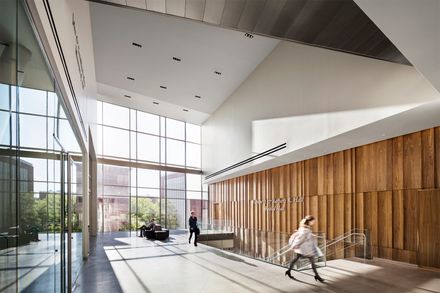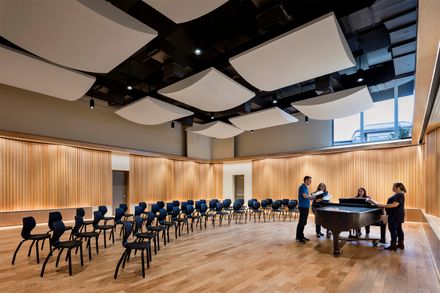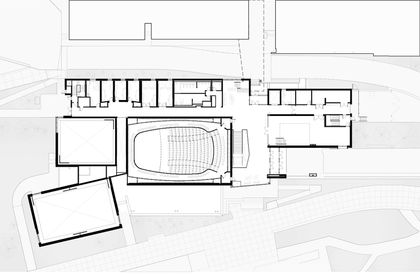
University Arts Building
MANUFACTURERS
Dri-design, Arcadia Inc., Armstrong Flooring, Guardian Glass, Series Seating, B & C Cabinets And Millwork, Basalite Concrete Products, RPG Acoustical Systems
ARCHITECTURAL DESIGNER
Adam Strauss
CATEGORY
Theaters & Performance, University
LEAD ARCHITECTS
DLR Group – Dennis Bree
MECHANICAL & PLUMBING ENGINEERING
Ainsworth Associates Mechanical Engineers
LANDSCAPE ARCHITECTURE
La Studio Nevada
LOCATION
Reno, United States
CIVIL ENGINEERING
Odyssey Engineering
STRUCTURAL ENGINEERING
Hyytinen Engineering
PROJECT ARCHITECT
Dan Karas, Aia
ACOUSTICIAN
Jonathan Hopkins
LIGHTING DESIGN
Yosuke Hiraiwa
ELECTRICAL ENGINEER
Radames Cocco, Pe
Text description provided by architect.
Known as a vibrant arts campus, the School of the Arts is the artistic epicenter for the University of Nevada, Reno, encompassing the university’s art, music, theater, and dance departments.
Originally designed by renowned Modernist architect Richard Neutra, the Church Fine Arts complex opened in 1962 and has since served as a welcome center new building for the university’s booming arts scene.
Positioned in a central location on campus, the serves as a home to world-class performances and major exhibitions the entire community can enjoy.
The new facility features a 287-seat recital hall, museum of art, fabrication lab, electroacoustic composition lab, rehearsal spaces, music practice rooms, faculty offices, and a recording studio.
Engaging the topography of the site, the design creates an active outdoor plaza that links to campus pedestrian walkways and preserves a large grass hill, the last remaining piece of the university's original football stadium
Upon entering the building, visitors are greeted by a multitiered lobby, connected to the plaza, street, and bridge levels, and serves as a hub and showcase for performance, display, and learning.
The recital hall employs seating arrangements that fosters enhanced acoustics and flexible teaching configurations. Lower wooden walls in the space are designed to be highly diffusive
Broadcasting sound in many directions; upper side walls conceal variable acoustic drapery and acoustic diffusive panels. To accommodate a variety of performance needs, the room can be tuned and adjusted for reverberation time without altering the warm wood aesthetic.
The recital hall’s wraparound balcony affords audiences a unique perspective, and can also provide students closer views of musician hand positions and conductor gestures.
The electroacoustic composition lab (EAC lab), a first-of-its-kind in Nevada, features octophonic sound with eight speakers positioned around the room that can work in unison or function independently to support the creation and performance of music.
The EAC lab is highly flexible, with deeply embedded technology and infrastructure that allow for a wide array of digital music composition, playback, and enhanced cross-discipline collaboration between musicians, and students in video production, visual arts, and engineering.
The Lilley Museum of Art features atmospheric and security protocols to house and display oversized objects, antique and climate-sensitive artworks, and items of significant value, improving the university’s ability to borrow artwork from collectors and museums
An extension of the lobby, the museum allows patrons to connect with the art while attending a music performance. At night, the north-facing window is a beacon of light, illuminating the art objects and giving the effect that the building is glowing with artwork.






















